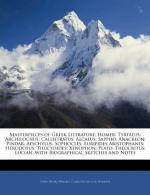|
This section contains 4,395 words (approx. 15 pages at 300 words per page) |

|
SOURCE: “Archilochus and His Senses,” in The Classical Journal, Vol. 57, No. 7, 1962, pp. 289-96.
In the following essay, Will analyzes Archilochus's method of conveying his sensory experiences through the meter and diction of his poetry.
The immediacy of Archilochus' sense-experience to his poetry strikes us first in meter. This is something new. We never feel, with Homer or Hesiod, that the lived texture of the poet's experience is directly translating itself into the sound of his verse. Rather we seem always, in those two writers and throughout the epic cycle, to be hearing an impersonal, “epic” voice. Those creators address us from the end of an “epic” culture, the Mycenaean, and though Hesiod (fl. 730) may have been no more than three generations older than Archilochus (fl. 660), his aural tone sounds far older.1 It is deeply embedded in the past. Archilochus, as a person, reaches us immediately, and from his...
|
This section contains 4,395 words (approx. 15 pages at 300 words per page) |

|


